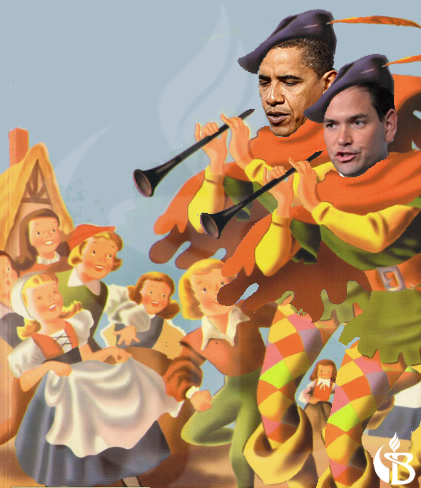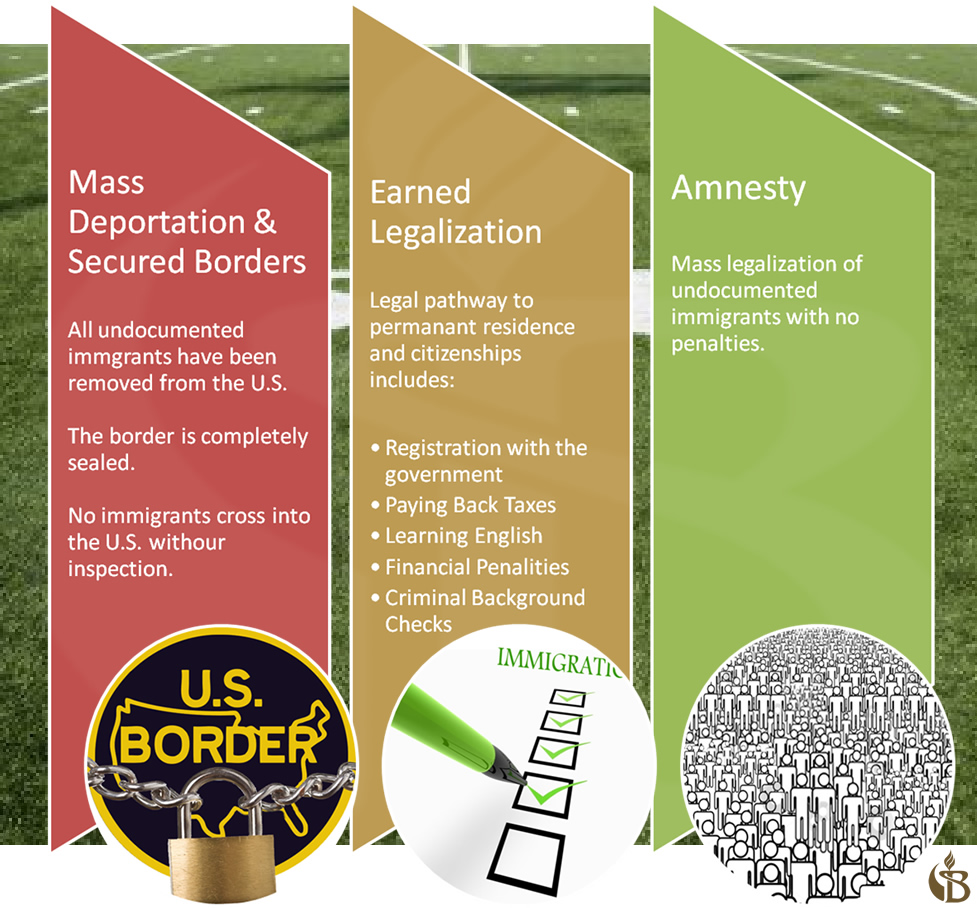
Our country, government leaders tell us, is in the throes of an economic recovery.
Not too long ago, according to leading monetary and labor indicators, we experienced a long, drawn-out depression. The politicians called it a recession. After being spoon fed the same rhetoric month after month, the public followed suit.
The depression was transformed into a recession.
Comprehensive Immigration Reform:
Now You See It, Now You Don’t
Likewise, the American public has lived through a lengthy period of immigration darkness.
Elected officials, chanting now is the time, have started working on a series of immigration measures. Over and over again, like a chorus line, they claim their efforts are focused on comprehensive immigration reform. Most of the public, including many immigrant rights advocates, have followed suit.
Meanwhile, only a loosely connected set of law enforcement and business ideas have been proposed.
The political Pied Piper effect.
Worse, many undocumented immigrants are excluded by the current rhetoric, left with no more hope than before November 2012.
Similar to the countless individuals who suffered through the depression, they have been removed from the immigration reform equation. Out of sight, out of mind.
Like the manipulated societies envisioned by Aldous Huxley and George Orwell, the immigration reform discussions reflect, once again, how we live in a new world order governed by political figureheads who have mastered the art of double speak – and among a public willing to accept legislative crumbs for their votes.
Building Fences Around Immigration Reform
After the November elections ended, without any reservations, media pundits, political commentators, and members of Congress intimated immigration reform was a done deal.
The public’s acceptance of the proclamations was proven misplaced just a few months later.
Of course, the political refusal to begin reform discussions until after the new Congress was seated and the President was re-inaugurated should have clued immigrant supporters about the political reality about to unfold.
Senator Rubio charged out first. Then, not to be outdone, the Gang Of Eight went public on a Sunday afternoon, with their plan. Two days later, the President spoke for 25 minutes on immigration reform.
To date, the public still knows very little about concrete details.
Despite all their huffing and puffing on the topic, Congress and the President have limited their comments to the parameters of acceptable changes to immigration law.

In other words, they are debating what to debate.
Or put another way, they are building political fences around what is and what is not acceptable for legislative discussion. Even before any real agenda items are laid out for debate.
To the extent some general issues are deleted from discussion at this stage, the sub-set of concerns falling under such issues are preempted from future legislative negotiation.
To be blunt, it’s a double whammy.
First, the big picture of immigration reform is narrowed. Then the legislative process will whittle away other important concerns.
As a strategy for passing something, this approach may work.
As a strategy for passing comprehensive immigration reform, it’s a smoke screen.
It’s designed to help Congressional members justify their immigration reform votes to their respective constituencies in 2014.
If you’re an advocate for immigrant rights, what you thought you heard earlier is not what you should expect to get from Congress.
Some changes to our immigration system will likely be made. The sum will not equal comprehensive immigration reform.
The Art Of Preventive Political Medicine
Stealing a page from preventive medicine, the strategy of preventive politics consists of taking measures in advance to keep certain issues from arising later, rather than treating their deeper symptoms.
This contrasts with curative politics which addresses social and economic problems at their core, causing elected officials to take actions which may expose them and their party cohorts to criticism during the next election cycle.
This approach has been on full display the past few weeks.
- During his Las Vegas immigration speech, Obama praised his record-breaking deportation totals without addressing that approximately 50% were immigrants who lack criminal convictions, and who have substantial lawful permanent resident and U.S. citizen family ties.
- Shortly afterwards, in an interview with Telemundo, Obama declared, “I’m not a king,” attempting to shrug off the effects of his deportation policies on undocumented immigrants. Although the President acknowledged having discretion when it comes to immigration enforcement issues, he stated discretion requires setting priorities, and stressed those have been set. In translation, this means slowing the pace of deportations is not on the President’s reform to-do list.
- Moreover, as Colorlines reported, in a meeting with DREAM Act leaders on February 5, 2013, the President went a step further. According to Lorella Praeli, Policy Director of United We Dream, Obama said he believes has more leverage to pass reform legislation if enforcement remains a top agenda item.
It’s 2012 all over again. As displayed during the recent elections, it’s the art of publicly supporting immigration reform without truly addressing several core problems, such as separated families and massive deportations, stemming from a broken immigration system.
Preventive politics at its best.
The Moving Goal Posts Of
Immigration Reform
“Are there options we should consider between the extremes of mass deportation and a pathway to citizenship?” Rep. Bob Goodlatte (R-Va.), Chairman of the House Judiciary Committee, asked last Tuesday during the first hearing by his panel on immigration reform in the 113th Congress.
With those few words, the anti-immigration forces subtly moved the goal posts of immigration reform.
Whether immigrants, who enter our country without inspection or stay here beyond their authorized periods, should be allowed to ever become lawful permanent residents has been one of the thorniest issues in our national immigration debate.
Reform opponents have long supported tougher immigration controls. In their view, undocumented immigrants are solely responsible for their predicament. They believe such immigrants should have thought long and hard about the effects which their decisions would have later on in their lives.
For opponents, the debate has centered on a zero sum game. Do we secure the border, throw away the keys, and not allow anyone to remain who has not entered lawfully or do we grant “amnesty” to everyone?
In their perspective, this dichotomy represented the full range of reform choices.
All the while, a third solution, an earned pathway to permanent residency and citizenship, silently rested in the background.

Now that the possibility of a middle road has surfaced, reform opponents have substituted the phrase “a pathway to citizenship” for “amnesty.”
Under the opponents’ new goal posts, the immigration debate is being postured as a division between enhancing law enforcement and creating a legal pathway to citizenship.
In my view as a Riverside immigration attorney, by reclassifying earned permanent residency and citizenship as an extreme position, opponents are endeavoring to reduce the political middle from full earned legalization to programs which grant immigrants only temporary permission to live here.
This tactic goes hand-in-hand with a parameter setting process linking future in-flows of immigrants to our nation’s economic needs, especially for certain low-skilled jobs and high-tech positions.
Hailed in some corners as a pragmatic solution, this approach has nearly no resemblance to our country’s historical promise to helping others in need, irrespective of economic needs:
Give me your tired, your poor,
Your huddled masses, yearning to breath free,
The wretched refuse of your teeming shore,
Send these, the homeless, tempest tost to me,
I lift my lamp beside the golden door.
Lost in the shuffle are undocumented immigrants, whose circumstances presumably propelled immigration reformers into political action.
Instead, coupled with the President’s reluctance to utilize lowering immigration enforcement levels as a negotiation tool, the GOP sleight of hand reduces the plight of undocumented immigrants to inactive status.
In short, comprehensive immigration reform in 2013 is a tale of two visions.
At first glance, seduced by the illusions promoted by Congress and the President, comprehensive immigration reform is right around the corner.
On closer inspection, there is nothing comprehensive about the loosely connected immigration measures being touted.
Now you see it.
Now you don’t.
By Carlos Batara, Immigration Law, Policy, And Politics




